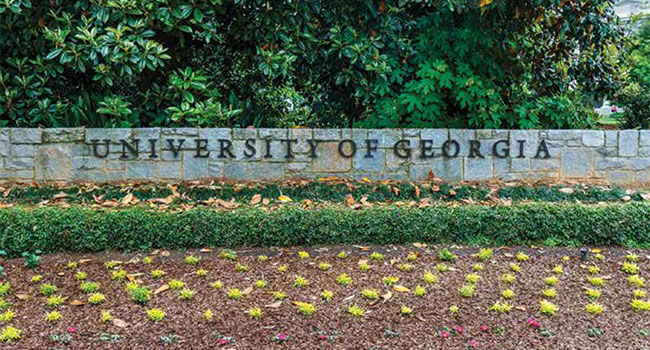
Overhauling Access Control
University of Georgia has safety on its mind with transition to adaptable security system
- By Jason Friedberg
- April 14, 2020
When universities create a safe learning environment,
next-generation leaders can thrive. With
an enrollment totalling over 36,000 students,
the University of Georgia knows this well. This
top-rated public university invests in technologies
that help its police department secure six campuses while
remaining mostly out-of-sight. No matter the incident, officers
respond quickly. This reinforces a strong sense of safety and ensures
students are focused on what matters — getting good grades and
enjoying campus life.
Finding a Solution to Fit Unique Requirements
Keeping hundreds of buildings secure on a 762-acre main campus
and five remote campuses isn’t a simple task. It became even more
difficult for UGA when an older proprietary access control system
began failing. Repairs were getting costly as the solution neared the
end of its lifecycle.
In search for a new solution, UGA wanted more flexibility with
controlling doors. Many of its facilities have different requests and
schedules, so each department needed to customize the system to suit
their programs and building rules. They also wanted a solution that
could easily integrate with many devices and systems, and scale
across all campuses. The team considered many options, including
Security Center, the unified security platform from Genetec Inc.
“It all started with door security, but as we went further into the
selection process, we learned more about how Security Center
could unify access control with video and automatic license plate
recognition (ALPR) systems,” said Jeffrey Swindle, the lead access
control systems administrator at UGA. “We also had the option to
adapt the system to our unique environment using some very granular
settings.”
Security Center met all of the university’s requirements. Furthermore, the Auxiliaries department on campus was already using the
AutoVu ALPR system to enforce parking rules. UGA commissioned
Convergent Technologies, a global service-based integrator, to handle
the initial installation.
Staying Ready for Any Incident on Campus
So far, UGA has converted 10 buildings on the main campus in Athens,
and another eight buildings at the Griffin campus, just a few
hours away. Operators keep watch over 250 doors and 100 video cameras.
As incidents come up, operators immediately respond.
“Now, when there’s an alarm, our dispatchers don’t have to go digging
through different video systems to try to find the incident,”
Swindle said. “They can see the live video of the event, and quickly
locate the incident on the plan manager map interface to direct
responding officers.”
Upon completion, UGA is aiming to have over 1,000 cameras,
1,600 door readers and 400 users on the Security Center platform.
Using the Threat Levels feature of Security Center, Swindle and his
team have planned response workflows for different types of situations.
If an emergency situation occurs, the system will immediately
adapt to help responders follow procedures.
Making Everyday Tasks Easier with Customization
Securing the university buildings is a team effort at UGA. While the
campus police department responds to alarms, facility managers
handle day-to-day administrative tasks. Facility managers can change
cardholder privileges and receive automated reports to see who’s been
accessing the building.
Facility managers have also been empowered to oversee their
unique building schedules. That’s because Preferred Technologies, an
integrator specializing in custom solutions, developed a unique
Schedule Management Plugin for UGA. The Genetec Professional
Services team supported the development process.
“The university has a general holiday schedule, but every department
is different. Some will still allow faculty or students to access
certain buildings during the holidays,” Swindle said. “With the plugin,
it’s now easier for facility managers to set weekly building schedules
months in advance, and make exceptions for academic events
and holidays.”
The UGA team has also streamlined its Human Resources processes.
As soon as the HR team inputs an employee’s termination date
in the HR system data feed, Security Center will automatically deactivate
the cardholder per UGA policy.
“The flexibility we get has been integral to our success with the
platform,” Swindle said. “We’re able to adapt the system to do pretty
much anything we need.”
Enhancing Security One Phase at a Time
The entire upgrade will be rolled out in phases over the next few
years. The university is installing Security Center in one building at
a time.
UGA kept existing readers by using the Synergis Cloud Link, an
intelligent IP controller that supports non-proprietary access control
hardware. On the surveillance side, they chose BCDVideo servers for
a powerful and cost-effective storage solution, and a mix of cameras
from Axis Communications, Bosch, Sony, and other vendors to meet
the unique requirements of each location.
In the future, UGA might consider merging the existing standalone
AutoVu system with the newly-installed access control and
video systems to achieve a cohesive campus-wide solution.
“We’re always looking to provide better security for students and
staff, but our goal is to make it as un-intrusive as possible. With Security
Center, we’re doing just that,” Swindle said. “Our teams are better
equipped to manage building security and to quickly respond to any
incident on our campuses. Nothing has really changed for students
and faculty, it’s just day-to-day campus life as usual.”
This article originally appeared in the March April 2020 issue of Campus Security Today.